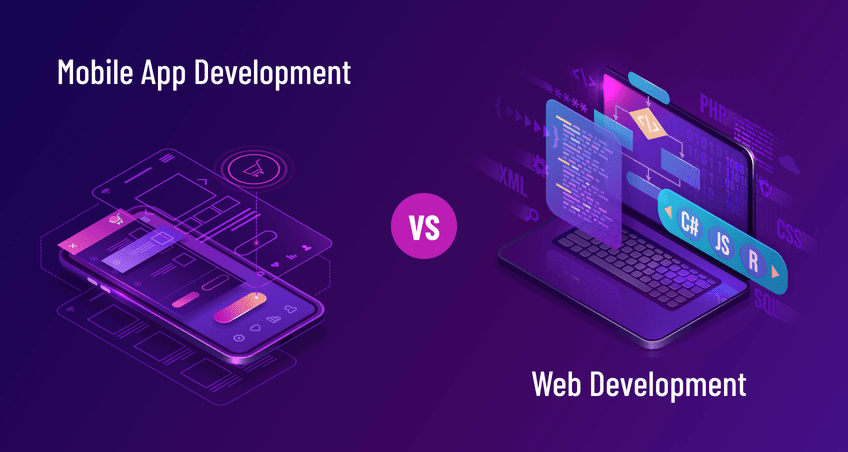In the realm of software development, one of the fundamental decisions that businesses and developers face is whether to invest in web or mobile app development. While both have their merits, the choice ultimately depends on your specific goals and requirements. In this comprehensive guide, we’ll explore the advantages and disadvantages of web and mobile app development, helping you make an informed decision about which approach aligns best with your objectives.
Understanding Web Development:
Web development primarily involves the creation of websites and web applications that users can access through web browsers. It’s a versatile choice for businesses and developers for several reasons.
1. Cross-Platform Compatibility:
- Web applications are accessible on various platforms and devices, making them highly versatile. Users can access your web app from desktop computers, tablets, and smartphones without the need for separate versions.
2. Cost-Effective Development:
- Web development typically requires less investment compared to building native mobile apps. A single web application can reach a broader audience, potentially reducing development costs.
3. Easier Maintenance:
- Updates and maintenance for web applications are relatively straightforward. Changes can be implemented on the server-side without requiring users to download and install updates.
4. Faster Development and Deployment:
- Web apps can be developed more quickly than mobile apps. This is especially beneficial when you need to launch your product or service rapidly.
5. SEO and Searchability:
- Web applications can be optimized for search engines, making them more discoverable to users through organic search.
However, web development does come with its set of limitations:
1. Limited Access to Device Features:
- Web apps may not have the same level of access to device features (like camera or GPS) as native mobile apps, which can limit their functionality.
2. Offline Access:
- Web apps often require an internet connection to function. While some offline capabilities can be added, they are generally not as robust as those of mobile apps.
3. Less Immersive User Experience:
- Web apps may not provide the same immersive experience as mobile apps, particularly for activities like gaming or complex interactions.
Exploring Mobile App Development:
Mobile app development Company involves creating applications specifically for mobile devices like smartphones and tablets. Mobile apps are installed on the device itself and can be accessed without a browser.
1. Enhanced User Experience:
- Mobile apps offer a more immersive and responsive user experience compared to web apps. They can leverage device features, resulting in smoother interactions.
2. Access to Device Features:
- Mobile apps have full access to device features like GPS, camera, and push notifications, allowing for more sophisticated functionality.
3. Offline Functionality:
- Mobile apps can offer substantial offline capabilities, ensuring users can still use the app without an internet connection.
4. Monetization Opportunities:
- Mobile apps can be monetized more effectively through app stores, in-app purchases, and subscriptions.
However, mobile app development also has its challenges:
1. Platform-Specific Development:
- Creating mobile apps for iOS and Android requires separate development, potentially increasing costs.
2. Installation and Updates:
- Users need to download and install mobile apps, and updates may not always be immediate, leading to version fragmentation.
3. Higher Development Costs:
- Building native mobile apps can be more expensive than web app development, especially if you need apps for both major platforms.
4. Longer Development Timelines:
- Mobile apps often take longer to develop, which might not be ideal if you’re looking for a rapid launch.
Choosing the Right Path:
The decision between web and mobile app development boils down to your specific needs. Here are some key considerations:
1. Audience and Goals:
- Consider your target audience and your app’s objectives. If you aim to reach a broad audience across multiple devices, web development may be a better choice. If you need to leverage device-specific features, mobile app development is the way to go.
2. Budget and Resources:
- Evaluate your budget and available resources. Web development is typically more cost-effective, while mobile app development might require a larger investment.
3. Timeline:
- Determine your project timeline. If you need a quicker time to market, web development could be your best bet.
4. User Experience:
- Think about the kind of user experience you want to provide. If it’s essential for your app to offer a highly interactive and immersive experience, mobile app development is preferable.
5. Offline Functionality:
- Consider whether your app needs to function offline. If so, mobile app development is better equipped for this.
Conclusion:
Conclusion, the choice between Apps Cre8ve | Mobile App & Web Development Company In Florida, web and mobile app development is not one-size-fits-all. The decision should align with your project goals, budget, timeline, and desired user experience. By understanding the advantages and limitations.

